By Anita Jones/September 1, 2011
This lil’ light of mine, I’m gon’ let it shine….everywhere I go…let it shine, let it shine, let it shine.”
Jane Fonda shoots from the hip. Granted–the hip has been replaced, but that only serves to make it stronger, wiser, more resilient, like Jane. She has taken the tragedies and triumphs of her 73.5 years on the planet and distilled them into a message so powerful, so pristine, so present that as you listen you can’t help but get it, regardless of your personal profile.
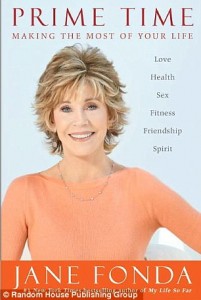 I recently attended a lovely Literary Breakfast in August at the Corte Madera Book Passage where Jane talked about her new book, Prime Time: Love Health, Sex, Fitness, Friendship, Spirit–Making the Most of All of Your Life. As soon as she entered the room of 130 seated at tables, her energy spread; she claimed the space with her smile and unmistakable voice.
I recently attended a lovely Literary Breakfast in August at the Corte Madera Book Passage where Jane talked about her new book, Prime Time: Love Health, Sex, Fitness, Friendship, Spirit–Making the Most of All of Your Life. As soon as she entered the room of 130 seated at tables, her energy spread; she claimed the space with her smile and unmistakable voice.
Right now I’m ankle deep in American civil rights research for my novel-in-progress and the great songs of the era play incessantly in my head, which explains why–enroute to the bookstore that morning –the song, This Little Light of Mine played in my head. Once she got into her talk, I saw an immediate connection. Jane at the podium felt like church. She had some serious personal gospel to share, and she lit up the room.
In her introduction, Elaine Petrocelli, the President of Book Passage, set the tone with a mix of thoughtfulness and humor, allowing Jane to segue into one of her favorite chapters from the new book: The Lowdown on Getting It Up in the Third Act.
ACT III is Jane’s name for the phase of life that begins at age sixty.
She wrote the book after noticing that in her sixties she felt better than ever and wanted to know if this was unique. She was intensely curious about aging, the brain, body, wisdom, spirit–all the things we need to do to “ascend the staircase” of aging versus descending into “decrepitude.”
She said people are surprised to learn that Jane, the “college-dropout-movie-actor”, is a born student who loves to learn and share what she finds important. She spent four years researching and distilled knowledge from all sorts of experts into her essential ingredients for aging successfully.
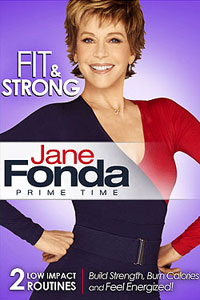 Her life so far has gifted her with the light of wisdom; this sounds trite, but it’s true. Jane Fonda is a wise woman, a totally hip elder for the new millennia. More importantly, Jane is down with that. As I looked at her svelte, fit body at the podium, I thought if we could all look this good at her age, we, too, could go more gently into that next phase.
Her life so far has gifted her with the light of wisdom; this sounds trite, but it’s true. Jane Fonda is a wise woman, a totally hip elder for the new millennia. More importantly, Jane is down with that. As I looked at her svelte, fit body at the podium, I thought if we could all look this good at her age, we, too, could go more gently into that next phase.
I admit to being pleasantly surprised to find that for Jane at this juncture it is about so much more than how she looks. “It’s about functionality,” she said, “being able to be independent, to get up and down from chairs, in and out of cars.”
The oldest set of us baby boomers is ten years younger than Jane, but like her, we cut our teeth on the activism of the 1960s and 70s, and barely escaped the AIDS sexual revolution of 1980s. If you’re wondering what the “Third Act” can look like, then you have only to look at 2011 Jane Fonda for an iconic model.
She is forthright, unabashedly not perfect, but striving to be whole.
A natural storyteller, not to mention Oscar- and Emmy-winning actor, Jane wastes no time and no words, and her comic timing is spot on. We laughed with her as she glanced at coffee cake crumbs on her plate right after talking about the necessity of “eating meaningful calories.
Jane has survived much, including the suicide of her bi-polar mother when she was twelve and never being thin or beautiful enough in the eyes of her father, Henry Fonda. She spoke of both these life-shaping events from her deeply personal point-of-view of forgiveness, a pinnacle she was able to attain after doing the hard work of a life review–researching oneself.
[youtube=https://www.youtube.com/watch?v=PKN2wiTUtN8]
She said we must ask tough questions like “Who were/are your parents as people? How did/do they show up for their children …? How did their parents show up? These answers shape us when we are very young.”
This is a cautionary tale for our adolescents everywhere (especially girls) who may be going through what Jane went through–guilt, broken trust, and hatred of body leading to eating disorders. She has learned to not let these things define her, anymore than she is defined by her replaced hip or knee or the fact that she is a septuagenarian.
“You need to find out how come your parents treated you that way…” Jane
“I grew up thinking if I was not perfect I wouldn’t be loved….leads to a lot of problems…it gets worse when a girl becomes an adolescent and it stays throughout life…You need to find out how come your parents treated you that way…Unpacking the past allows us to see that it had nothing to do with us,” she said.
Of all the things she shared that morning, I was moved most by two stories. The first is about using a life review or meditation/prayer to change the norm from negative to positive. This allows us to “forgive….come to a new understanding and begin to view more positively, and with an open heart, the people and realities of our past.”
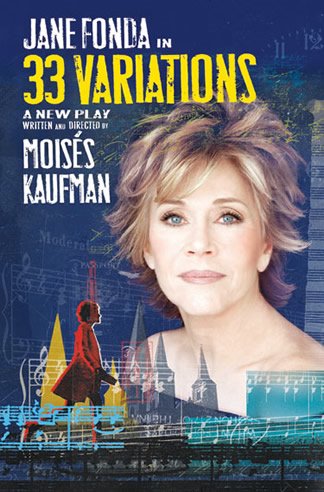
If we sustain this positive attitude we can actually create new neural pathways in the brain. For women, Jane said, “You become different. You become the girl you were before you entered puberty.”
She was clearly moved–and we were all with her–as she paraphrased T. S. Elliot: “You circle back to where you started and know the place for the first time. You become the person you were always intended to be, and there’s a lot of forgiveness along the way.”
She spoke of rehearsing her death in my other favorite story in Prime Time. At the breakfast, she compared it to the birth of her two daughters. The first time she winged it, and “it was very difficult.”
The second time, when she was married to Tom Hayden and they went to a birth educator, she saw that “knowledge is power. Knowing what to expect made it possible to not become a victim of the pain but ride on top of it.”
The death scene she imagines has her in bed surrounded by loved ones. They are holding her hand, and she is vibrant enough to interact with the love in the room. Now, she said she must live her life in a way that will get her there.
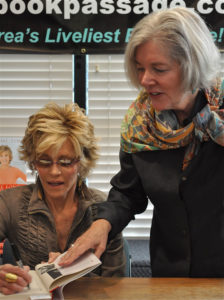
Breakfast with Jane was fun and enlightening, a cross between a literary event, a spiritual retreat, and (as Elaine said) a wedding reception. Jane left us with an apropos quote from Picasso ~ “It takes a long time to become young.”
She is where one would hope an elder would be at this point–well rehearsed. Fit and able to ride out the inconveniences of aging, she seems happier than ever in this Third Act.
She’s not afraid of the hard work still left to do. With all the lines and delivery down, her prior performances have prepared her for this glorious time in the light.
Let it shine , Jane…let it shine!
###
Jane recommended that we all show Gloria Steinem’s documentary to our girls: Gloria: In Her Own Words
Two of her great causes:
Jane Fonda Center for Adolescent Reproductive Health (Emory University)
Georgia Campaign for Adolescent Pregnancy Prevention
About the author:
Anita Jones is a writer, visual artist and oral tradition storyteller. Her novel-in-progress, Peach Seed Monkey, was a novella semi-finalist in the William Faulkner-William Wisdom Creative Writing Competition. She’s the Executive Director of the Gaines-Jones Education Foundation, a family foundation she co-founded with her husband, Robert Roehrick. They live in northern California with their daughter. You can contact Anita at peachseedmonkey@gmail.com.
Photos of Jane Fonda at Book Passage by Anita Jones
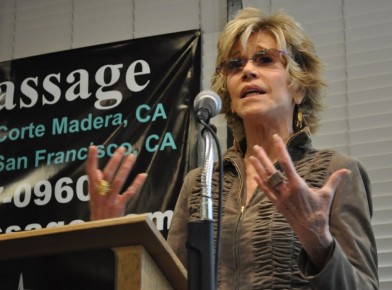


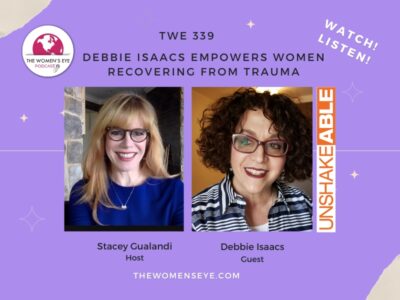
“You circle back to where you started and know the place for the first time. You become the person you were always intended to be, and there’s a lot of forgiveness along the way.” I think this quote of T.S. Elliot describes how we all feel about Jane. We have all watched her public mixed metaphor life journey and have retuned to love, understand, forgive and appreciate her for her diversity and i think you captured all of that. Thank you.
Judith